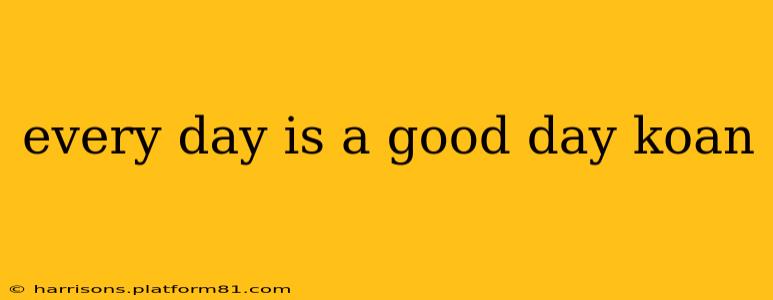The seemingly simple statement, "Every day is a good day," acts as a powerful koan, a paradoxical riddle used in Zen Buddhism to challenge conventional thinking and spur enlightenment. It's not a statement of naive optimism, but rather a profound invitation to examine our perceptions of experience and cultivate a deeper understanding of ourselves and the world. This post delves into the meaning behind this koan, exploring its implications and offering practical applications for daily life.
What Does "Every Day is a Good Day" Really Mean?
On the surface, the statement might seem overly simplistic, even dismissive of hardship and suffering. However, the koan's power lies in its ability to shift perspective. It doesn't imply that every day will be filled with joy and ease; rather, it suggests that regardless of the external circumstances, the potential for goodness exists within each day. This goodness isn't found in external validation or material possessions but in our internal state of being.
How Can I Apply "Every Day is a Good Day" to My Life?
This koan challenges us to actively cultivate a mindset of appreciation, even amidst challenges. This can be achieved through several approaches:
-
Practicing Gratitude: Focusing on the positive aspects of each day, no matter how small, helps shift our perspective. This could be something as simple as a warm cup of coffee, a kind word from a friend, or the beauty of a sunrise.
-
Embracing Impermanence: Understanding that all things are transient helps us accept the ups and downs of life without clinging to the good or resisting the bad. Every moment is fleeting, and within that fleetingness lies opportunity.
-
Mindfulness and Present Moment Awareness: By focusing on the present moment, we avoid dwelling on past regrets or future anxieties, allowing us to find peace and acceptance in the here and now.
-
Finding Meaning in Challenges: Difficult experiences, while painful, often offer valuable lessons and opportunities for growth. Viewing them as opportunities for learning, rather than insurmountable obstacles, can transform our perspective.
Isn't This Just Toxic Positivity?
No, this isn't about ignoring or suppressing negative emotions. It's about reframing our relationship with them. Acknowledging difficult feelings is crucial, but allowing them to define our entire day is self-limiting. "Every day is a good day" encourages us to find the good, even in the midst of the bad, fostering resilience and a sense of inner peace.
What if I'm Having a Really Bad Day?
Even on the most challenging days, there's still potential for growth, learning, and finding pockets of peace. Perhaps it's a small act of kindness, a moment of self-compassion, or the simple recognition that this too shall pass. The koan is not about denying hardship, but about finding the seed of goodness within any experience.
How Does This Koan Relate to Zen Buddhism?
In Zen Buddhism, the goal is not to eliminate suffering, but to transcend it by cultivating a deeper understanding of our true nature. This koan serves as a catalyst for this process, encouraging us to move beyond the limitations of our conditioned thinking and discover a more profound sense of peace and acceptance.
Conclusion: Finding the Goodness Within
"Every day is a good day" is a potent koan that encourages a shift in perspective, promoting gratitude, mindfulness, and acceptance. It's not about ignoring hardship, but about finding the potential for goodness within every experience, fostering resilience and a deeper connection to ourselves and the world around us. It's a journey of self-discovery, not a destination, and the practice of embracing this philosophy can lead to a more fulfilling and meaningful life.
